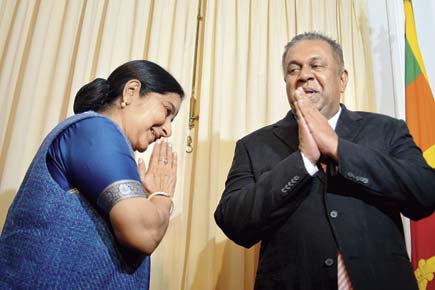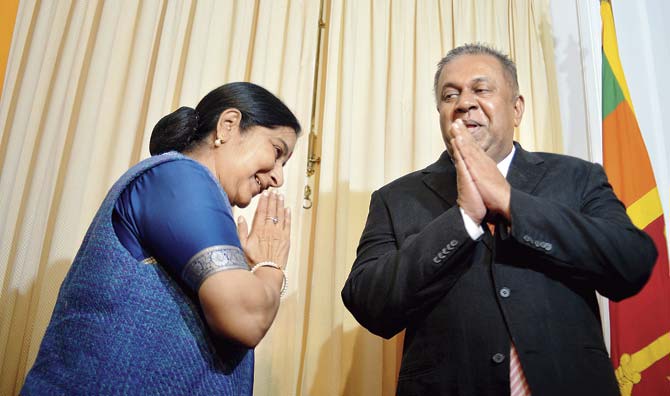By the end of this week, Prime Minister Modi would have visited Sri Lanka, Mauritius and Seychelles, notching up some more brownie points in the Love-Thy-Neighbour (including extended neighbourhood) trend

 By the end of this week, Prime Minister Modi would have visited Sri Lanka, Mauritius and Seychelles, notching up some more brownie points in the Love-Thy-Neighbour (including extended neighbourhood) trend. Within the first year of his tenure, the PM would have visited several neighbouring countries....including stringing his own moti-maala, India’s string of pearls in the Indian Ocean.
By the end of this week, Prime Minister Modi would have visited Sri Lanka, Mauritius and Seychelles, notching up some more brownie points in the Love-Thy-Neighbour (including extended neighbourhood) trend. Within the first year of his tenure, the PM would have visited several neighbouring countries....including stringing his own moti-maala, India’s string of pearls in the Indian Ocean.
India’s string of pearls is unlike China’s. It is not based on flaunting its military might or coercive diplomacy. It is more in the realm of a security embrace of nations in our extended neighbourhood. India has largely been a covert security and maritime security provider to Sri Lanka, Maldives, Mauritius and Seychelles, guaranteeing these countries stability during civil or military strife or natural calamities without demanding military, economic or political suzerainty.
ADVERTISEMENT

Indian Foreign Minister Sushma Swaraj and Sri Lankan Foreign Minister Mangala Samaraweera greet each other in Colombo, ahead of Prime Minister Narendra Modi’s visit to Sri Lanka on March 13-14. Pic/AFP
India’s leadership in this region comes at a time when China is increasing its maritime footprint in the Indian Ocean. The Asian super power has an insatiable appetite for strategic dominance in the continent. Getting into competitive strategic dominance in the Indian Ocean region with China is avoidable, yet inevitable if India has to ensure that its regional dominance is not diluted.
Prime Minister Nehru had said, “To be secure on land, we must be supreme at sea,” and India’s taking up the security leadership in the Indian Ocean is a step in that direction. After all, history has proven that all major powers have been maritime powers. Capacity building with partner countries in the Indian Ocean region will be a slow and delicate process. Especially with Sri Lanka.
PM Modi will be the first Prime Minister to have visited the southern neighbour in twenty-eight years. It has been a difficult relationship: The Sri Lankan war, India’s intervention via the IPKF, Rajiv Gandhi’s assassination by the LTTE, the ethnic Tamil issue, fishermen in each other’s waters and China’s growing involvement in the country’s infra projects. And the prospect of political instability that could arise if Sirisena is unable to control his coalition elements. China’s overarching presence in Sri Lanka, which was facilitated by former President Rajapakse, is not going to be easy to dilute.
But on the other hand, India is involved in several projects in Sri Lanka like hospitals, education, training its police force, tourism and now even civil nuclear cooperation. Somewhat on the same lines as with Maldives, Mauritius and Seychelles. These countries are part of the IOR-ARC (Indian Ocean Rim Association for Regional Cooperation) grouping. At present there are 19 members Australia, Bangladesh, India, Indonesia, Iran, Kenya, Malaysia, Madagascar, Mauritius, Mozambique, Oman, Seychelles, Singapore, South Africa, Sri Lanka, Tanzania, Thailand, UAE and Yemen. This poly-alignment suits India’s ambition of being an economic and military power in the region. India’s maritime strategic perimeter has by now extended from South China Sea to the African Coast.
With Modi at the helm of affairs there is no shying away from articulation of ambitions of India’s foreign policy. Every new administration has to evolve its foreign policy. It is dynamic in nature and the idea is to leverage opportunities that are there for the taking. The Prime Minister and his cabinet are not going to hesitate to string this garland of pearls in the Indian Ocean. There is no ambivalence now in what the country’s goals are in the immediate neighbourhood. Whether pursuing goals of blue economy or its predominance of being the only blue-water navy in the region, India is projecting itself as the stable, secure and dependable democracy that can be trusted as a friend and ally.
While the economy surges ahead and there are ambitious projections that the international finance community makes for India, the country also has third world problems. Challenges of eradicating poverty, integrating the millions who are still not in the ambit of development, providing roads and ports, food and shelter for its masses are still to be met, internal security problems that need to be tackled. These difficulties also bring us on the same wavelength as our neighbours such as Sri Lanka, Bangladesh, Maldives and Nepal who face similar problems. There is an affinity that these countries feel with India, that they cannot with say China or the US. It goes beyond mere cultural affinity. And then there is Pakistan. *That* is another story.
Smita Prakash is Editor, News at Asian News International. You can follow her on twitter @smitaprakash
 Subscribe today by clicking the link and stay updated with the latest news!" Click here!
Subscribe today by clicking the link and stay updated with the latest news!" Click here!







